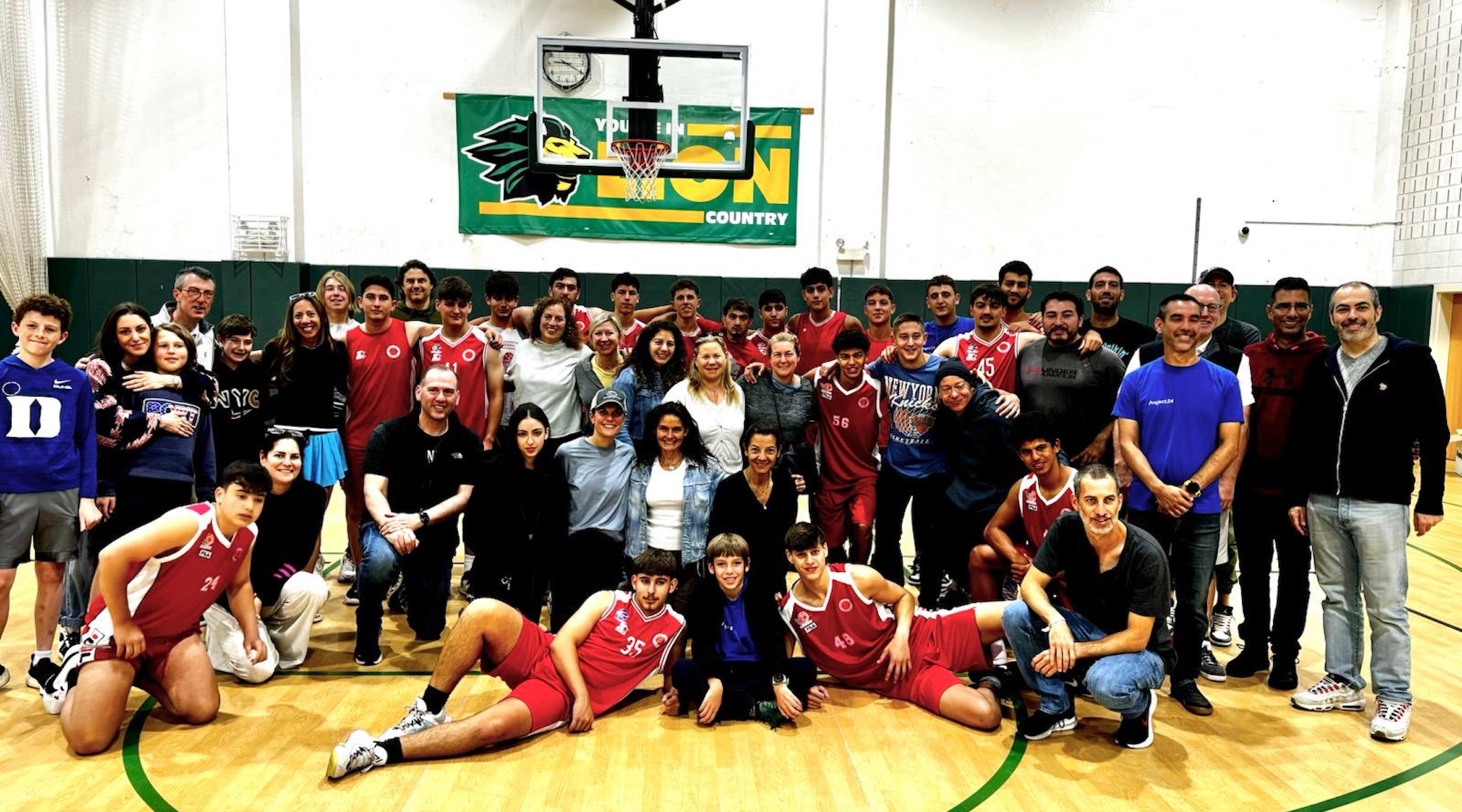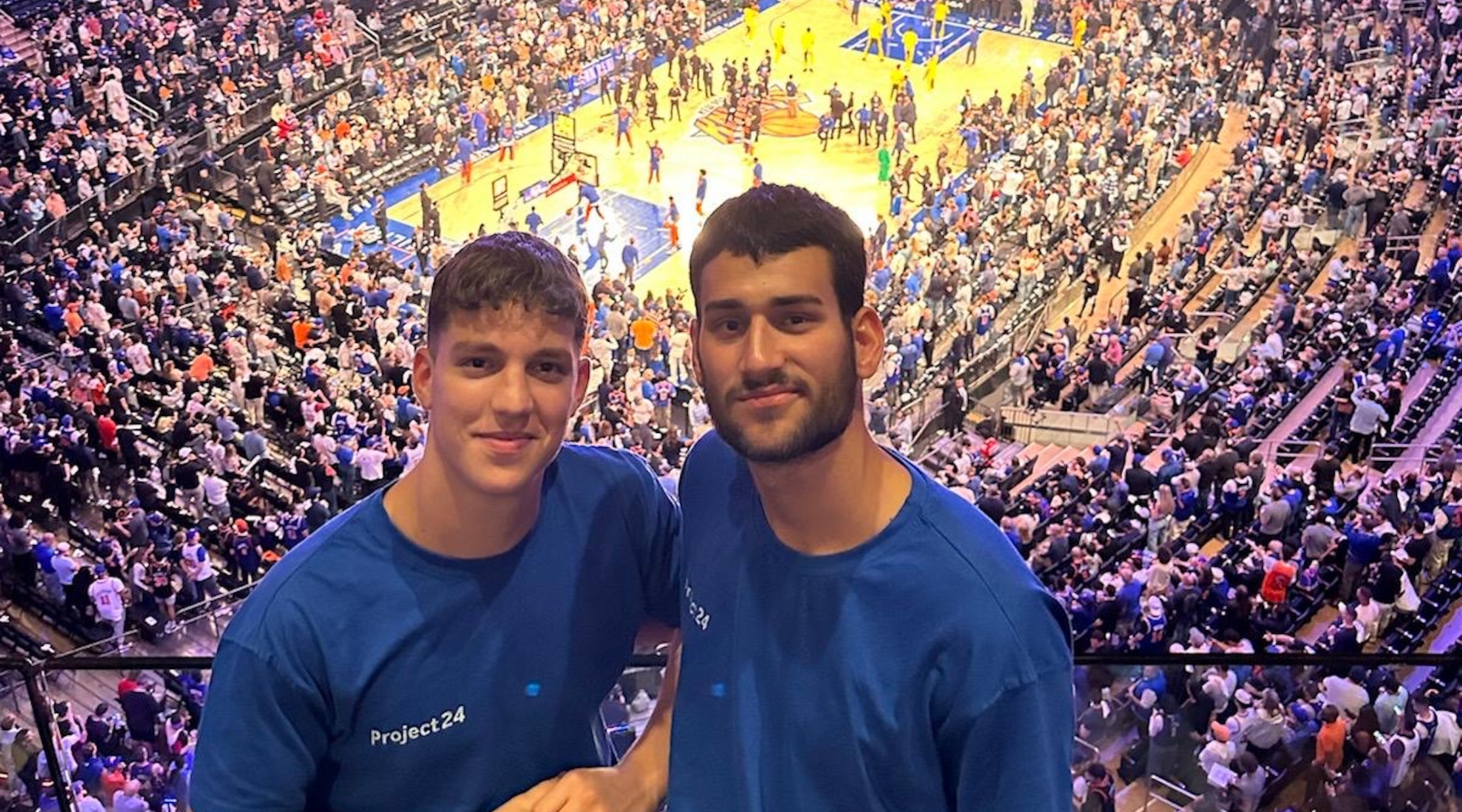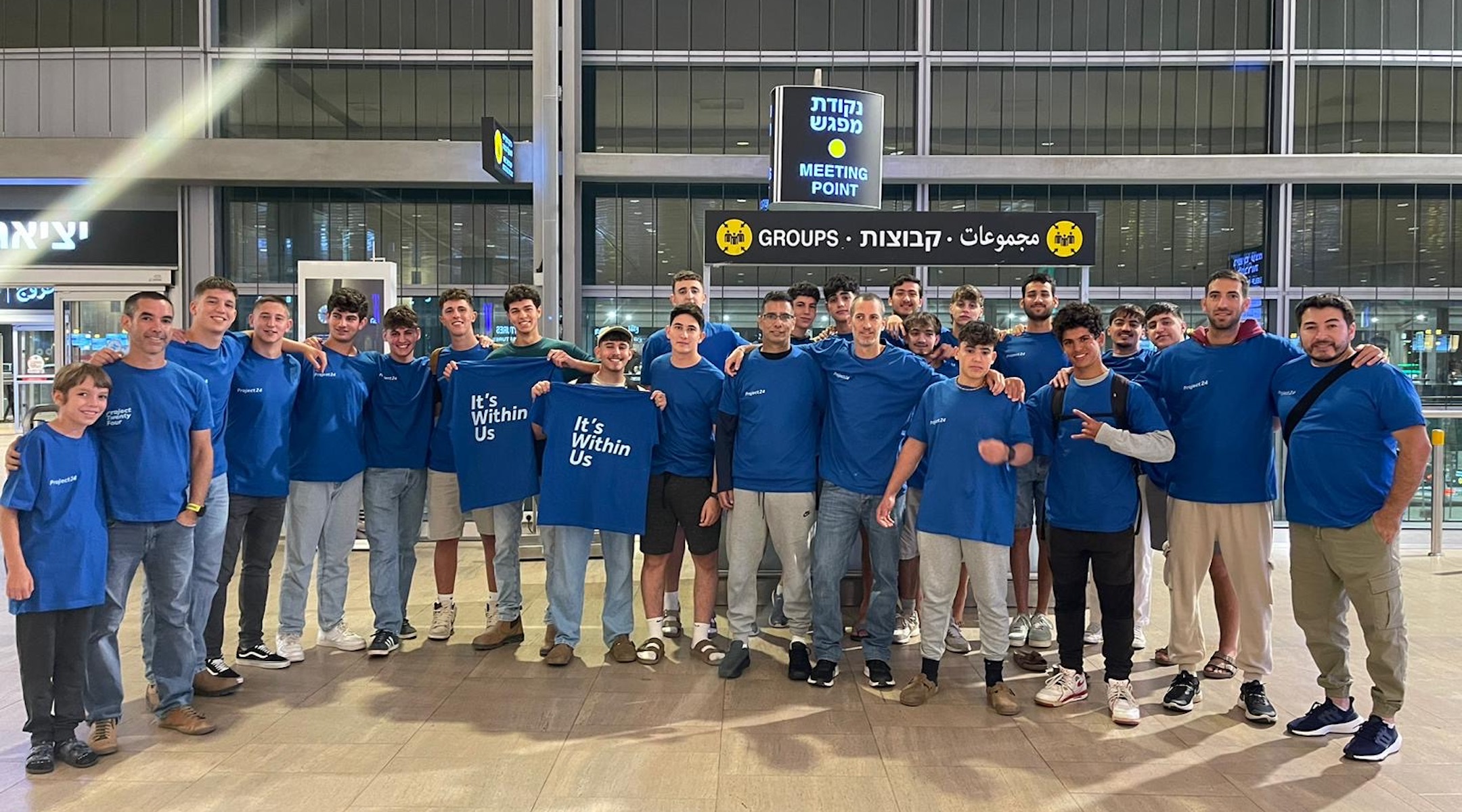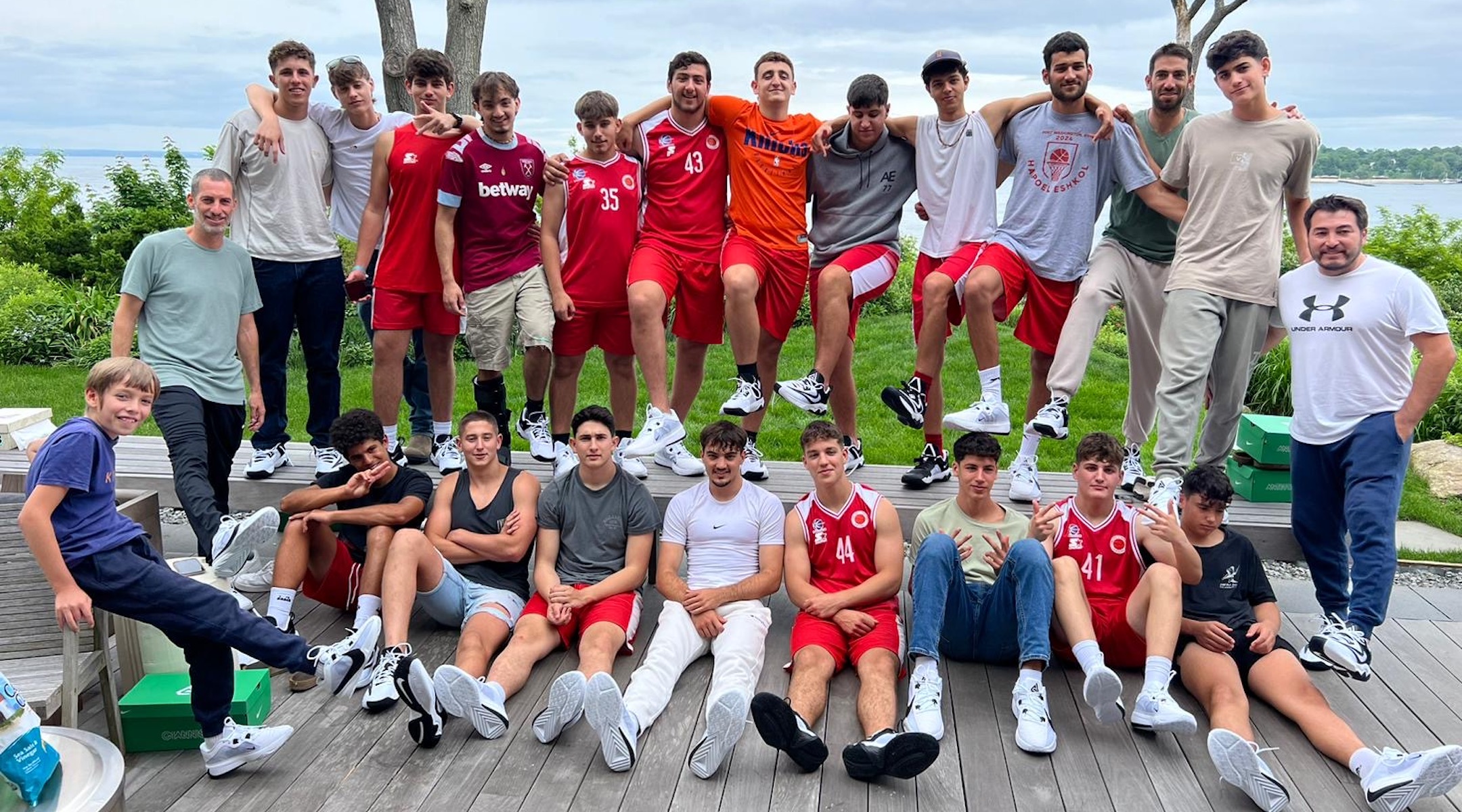(New York Jewish Week) — Before 19-year-old Guy Moses Auerbac walked into Madison Square Garden on Sunday afternoon to watch the Knicks face the Indiana Pacers in the playoffs, he was excited but didn’t know what to expect.
“It was amazing,” the Israeli, a recent high school graduate, told the New York Jewish Week on Wednesday, after the Knicks’ (sad) loss. “It’s huge and a lot different than the experience when you watch games in Israel. It’s a big show and the culture and the history of the stadium is amazing.”
It was Moses Auerbac’s first-ever NBA game and his first trip to New York City — an experience he’s sharing with 18 other boys. All are former teammates of HaPoel HaEshkol, a high school basketball team from the Eshkol Regional Council in Israel’s Negev desert. The region bore the brunt of Hamas’ Oct. 7 attack on southern Israel, when terrorists murdered some 1,200 people in Israel, kidnapped hundreds more and ransacked the area’s farming communities.
Many of his teammates had relatives or friends who were killed in the attack; some still have family in captivity. One teammate, Noam Or, was a hostage in Gaza himself, and when he returned to Israel in November with his sister, Alma, as part of a hostage exchange, he learned that his mother was killed and his father was missing. One of the team’s coaches, Avi Tzidon, was murdered on Oct. 7.
Since that terrible day, much of the team has been dispersed into temporary housing and hotels across Israel. The 10-day trip to New York is the first time since Israel’s war with Hamas began that they have been able to spend a significant period of time with each other.

The group with their host families after a basketball game in Long Island. (Courtesy Guy Moses Auerbac)
“We are best friends, not just teammates,” Moses Auerbac, who plays center, said of the group of boys between 15 and 20. “We hung out after the practices and in school and stuff like that, and we were playing together for the last few years.”
The team was brought to New York by Project 24, a nonprofit formed in Israel by businessman Daniel Gradus in the days after Oct. 7. His idea was to help Israeli victims of the massacre start to heal by creating experiences that bring some joy back into their lives. In March, the organization brought two swim teams — one from the southern region known as the “Gaza envelope” and the other made up of evacuees living in the North — to swim in the state-of-the-art pool at Princeton University; earlier this year, they brought a different basketball team to Miami, where they attended a Miami Heat game and met NBA players.
The group in New York this week — 19 teammates and four coaches — arrived last Wednesday and are here through the end of this week. They spent the first half of the trip in Port Washington on Long Island and are currently staying with families in Manhattan. Over the course of the action-packed visit, in addition to the Knicks playoff game, the boys went to a Yankees game, visited Central Park and played basketball against local Jewish day school teams at Ramaz and Heschel. Still to come: “Lion King” on Broadway and a WNBA game at the Barclays Center, where they’ll watch the New York Liberty play the Chicago Sky.
“It’s amazing — there are kids we haven’t seen in a while and we’ve only talked on the phone,” said forward Roi Beinart, 16 who like Moses Auerbac hails from a moshav called Sde Nitzan. “It’s been super fun to connect again. It’s super fun to hang out.”

Ron Beinart, left, and Moses Auerbac at Madison Square Garden on May 19, 2024. (Courtesy Guy Moses Auerbac)
“Considering what these kids have been through, to see them goofing around here in New York and having fun and playing in Central Park and going to games and making friends here is just unbelievable,” Project 24 founder Gradus told the New York Jewish Week.
Shortly after Oct. 7, while visiting friends who were evacuated from their homes to a hotel in Eilat, Gradus realized “there’s more things needed than just donations.”
“Donations are very broad and very big — they go to buildings, to agriculture, to housing,” he said. “They don’t go to a kid who lost his basketball tournament or a couple that was supposed to go on honeymoon, or someone who just opened his bakery. When we have such a big and complex event, no one has the ability to get into the details and listen to everybody.”
Gradus said Project 24 also provides an outlet for American Jews to lend a hand to Israelis beyond donating money. “If you can host, you host; if you can take them to a basketball game, take them to a basketball game,” he said. “Every American that wants to support from small to big has an option to do it.”
Here’s how their model works: Americans can donate $24 to become a Project 24 member. The organization contacts members about volunteer opportunities, which can range from hosting Israeli visitors or using connections — like obtaining sports or theater tickets — to create special memories. The organization also developed “matching” programs; for example, if American members buy themselves a challah or bottle of wine, Project 24 will send an Israeli the same. During Hanukkah, the organization worked with American communities to send Israeli kids gifts that the kids had asked for to replace items lost in the attack.
“It’s a win-win situation where we’re helping people in need and we’re giving people means to help,” Gradus said. “Everybody wants to do more. We can’t create big wins — meaning we can’t end the war, we can’t bring the soldiers back, we can’t bring the hostages back — but we can create small wins. Buying wine and taking a soldier to dinner is a small win.”

The team at the airport in Israel before their trip. (Courtesy Guy Moses Auerbac)
Upper West Sider Jeff Feig, a Project 24 member and a board member of 70 Faces Media, the New York Jewish Week’s parent organization, is hosting five boys at his apartment this week. “It’s been a fantastic experience having the kids here — they’re engaged. They’re so happy to be here. They’re very sweet,” he said, adding, “They eat a lot.”
Feig said that, in addition to donating to Israeli charities, he’s visited Israel three times since October and has seen many Israelis speak at synagogues and Jewish institutions. And yet, hosting the teens has been a new and moving experience.
“When you talk to them, you understand the level of trauma they’ve been through and are going through,” he said. “They want to go home. They want to be in their schools. They’ve lost family members, they’ve lost friends — and yet, they’re positive, they’re determined, they’re smiling. They’re laughing, they’re having fun. It’s really been a pleasure to be engaged with them.”
It’s also been an eye-opening experience for his two teen sons. “It’s mind boggling that people who went through horrible trauma are with us,” said Jacob Feig, 14, who has spent the week playing ping-pong and basketball with his new roommates and showing them how to use CitiBike and the subway. He added that the visitors are “awesome, super funny and nice.”
Despite the action-packed, sports-focused itinerary, one of the highlights of the trip for Beinart has been exploring all that the city has to offer. “It’s wild,” he said. “It’s crazy. You’ve got everything in the palm of your hand — you walk, like, a minute and there is pizza and boba and Dunkin’ Donuts.”
More than anything, however, Beinart said that meeting and staying with host families have been his favorite part of the experience — especially spending time with American kids of the same age. “They take you in immediately — the hospitality is incredible,” he said. “We play video games all the time with the younger brothers, and Guy helped the younger sister solve an ACT question that she couldn’t get. It’s so great.”
“In a big city like this, it seems like everybody’s minding their own business. But apparently we have almost ‘family,’ we can call them — people who just help you at every corner,” he added. “Even in Israel you don’t get that. In America, the Jewish community hugs you and takes care of everything you need.”
The New York Jewish Week brings you the stories behind the headlines, keeping you connected to Jewish life in New York. Help sustain the reporting you trust by donating today.





